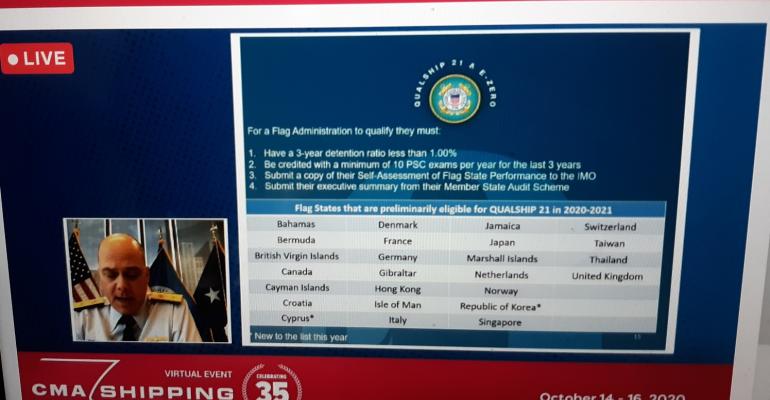Reflecting these themes US Maritime Administrator, Admiral Mark Buzby in his opening speech, followed by a US Coast Guard keynote provided by Rear Admiral Richard Timme, Assistant Commandant for Prevention Policy at this year’s virtual CMA event organised by Informa Connect.
In their speeches, presented through the Cmashipping2020 conference portal, both stressed what Buzby described as “adapting to circumstances at hand, and figuring out how to keep going” and emphasized that mariners are “finding ways to stay safe, while keeping our supply chains moving”. He stressed the importance of “staying in touch with all of our stakeholders and interagency partners”, including frequent weekly phone briefings to US shipowners on subjects including repatriation of seafarers.
The first day concluded with an exceptionally well-done panel, moderated by CMA Board Member Paul Mazzurelli, who is the Baltic Exchange’s representative in the States, and included a discussion of the extraordinary difficulties in getting seafarers home.
US Coast Guard Admiral Timme, also on this panel, identified a huge risk, saying: “the risk is the we will shut [the transportation system] down through the bureaucratically forced loss of mariners.”
Guy Platten, Secretary General of the International Chamber of Shipping, was emphatic about the nature of collective actions needed, noting that seafarer issues had reached both the United Nations and the Vatican. Referring to charterers who refused to book vessels where crew changes would be required, he offered: “That is completely unacceptable…..you’ve got shipowners, ship managers and crews suffering here.”
While praising the US Coast Guard for facilitating crew changes, he said “Countries have abdicated their responsibilities to abide by international conventions….every single country is somewhat to blame…with an unprecedented lack of cooperation by countries in solving the problem…” Following up, he said “To solve it, governments need to step up to their international responsibilities.”
Panel member Katharina Stanzel, Intertanko Managing Director, expressed frustration at a particular recent crew health incident, but was quick to note that historically (in pre-COVID days), Port State Control was very good with pro-active approaches and problem solving. Contrasting the earlier proactivity with the 2020 issues [moving seafarers back home], she said “…the problem here is much bigger….it’s much more complex…because it’s public health…and there are many more people involved in the chain.” She said, “If we all agree that this has to change, it can be done….we need a groundswell.”
ICS’s Platten summed up the panel’s prescription for setting things right, defining the groundswell as: “We need the whole supply chain, including governments and wider society, to take action here”, to solve this crisis.
Copyright © 2024. All rights reserved. Seatrade, a trading name of Informa Markets (UK) Limited.
Add Seatrade Maritime News to your Google News feed.  |

